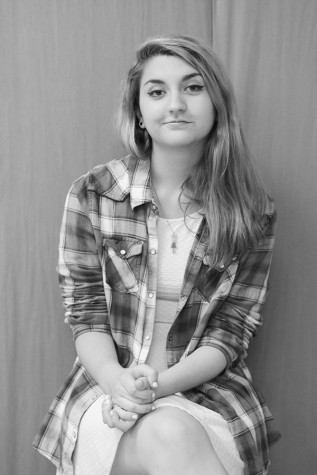No Justice No Peace
Ferguson’s Spotlight on America’s Great Racial Divide
From left: junior Remy Gordon and senior Corida Cooperwood stand in solidarity with Ferguson, protesting the death of Michael Brown.
September 19, 2014
Six shots were heard round the world Aug. 9 as 18-year-old Michael Brown was shot down on a street in Ferguson, MO. The man who pulled the trigger: Darren Wilson, a white, six-year veteran of St. Louis Police Department.
The incident occurred in the midst of a disturbing chain of police shootings since the Civil Rights Movement that some have called racial profiling and others have called tragedies unrelated to race. The civil unrest in Ferguson echoed allegations of unfair racial targeting by law enforcement across America, many noting that the headline, “Black, Unarmed Teenager Gunned Down By Police,” has become an eerily familiar sight online and in newsstands across the country.
“We already had something like this with Trayvon Martin, but it’s different when it’s a police officer doing it. Police officers are supposed to save people, you know?” junior Jada Smith said. “Darren Wilson should be in jail. Like, six shots, two in the head? And apparently, the police say Michael was running. That takes aim. He was aiming… They’re going to try to spin it as much as possible to make Darren look as innocent as possible when, truth is, he’s not so innocent. The six shots tell ’em right there. He’s not innocent.”
As Ferguson was hurled into the spotlight as the consequence of America’s polarizing racial divide, outraged citizens of Ferguson kicked protests into high gear the next morning. The calm only lasted so long, however, and by Sunday evening, the same streets that held peaceful protests just hours prior were in chaos with reports of assaults, opportunistic looting, and the arson of a local QuikTrip. Police reacted swiftly and with enough force that Amnesty International was forced to send advisers to the Midwest to investigate.
“At first, the police had to use a lot of force because there were riots, but as the protests have gotten more peaceful, the police are still using excessive force. In that area, as far as I’ve heard, it’s a mostly black community, but almost all of the police are white, so I feel like the tension [between Ferguson and its police force] has been going on for a while,” junior Remy Gordon said. “Sometimes I feel like racial profiling has been made out to be more than it is, but there are definitely instances where the police seem to target African Americans more than other races. Sometimes it’s not always true. Sometimes it just seems like that. I mean, I don’t hate white people. I don’t hate white cops. I understand, but sometimes I feel like they target African-American people.”
And public opinion of police officers by the black community closely reflects Gordon’s opinion. A poll by Pew Research Center, conducted Aug. 20-24, indicates that, when rating the performance of police officers, 70 percent of black pollers rated “poor” in the category of how well the police treat racial and ethnic groups equally, compared to 29 percent of white pollers who rated that police do a “good job”. When asked how well police are at holding officers accountable when misconduct occurs, 27 percent of white pollers and 70 percent of black pollers rated “poor.”
This disparity, Gordon says, is at least partially the product of both sides’ discomfort and unwillingness to talk about the deep issues surrounding race.
“People feel like they’re being racist if they talk about it. Some black people don’t like talking about it because of things that have happened,” Gordon said. “But honestly the only way it’s going to get better is if we talk about it as much as we can and make sure it’s a big issue and that it’s always being scrutinized and enforced. Whether it’s the whole nation at one time or just making sure that every parent talks about it and makes their children understand that nobody’s better than anyone else.”
Some students have kept up with the civil unrest in Ferguson through a project led by 11th grade English teacher Kendrick Blackwood. The objective: to write about the events of Ferguson through the perspective of different people in the city.
“This incident has sparked a wide range of reactions, and the way we see what happened is shaped by where we come from, our background and how we view the world,” Blackwood said. “The family of Michael Brown: the language they use and how they respond to their baby being killed is a lot different than Chief Jackson, who is the chief of police, who employed the officer who had the gun that killed Michael Brown… The students seem to be connecting to it.”
Blackwood says that many of his students already had some knowledge of the events in Ferguson, but felt the need to cover it in class to help them understand and process while staying within the junior English curriculum of studying different points of view and the attainability of the American Dream.
“American literature is junior level content,” Blackwood said. “Everything seems to tie back to this American Dream as it has changed over time. Is the American dream fair for everyone? Is it the same as what Michael Brown’s dream is growing up in a more impoverished neighborhood? I think we’re at a point where there’s real inequities. It’s hard. I have experience in urban Kansas City. The schools, for one, are different. They are not as functional as the schools here, and that’s not fair,” Blackwood said. “I think situations like Ferguson do provide a touch point for us, hopefully, to have a healthy conversation. Change is very hard, and I don’t know what to hope for, frankly.”
Gordon believes that change can be wrought and Ferguson can begin to heal once the police department indicts Darren Wilson and keeps the rest of their officers on tight watch.
“If Officer Darren Wilson was brought forward, it would discourage officers from doing the same thing in the future, because they don’t want the same kind of recognition,” Gordon said. “As it is right now, I feel like the police officers are always held with this god-like mentality, like they could never do anything wrong. The investigations are never as in-depth as they would be if a normal person did this. In that way, I’d say the investigation is not completely just. Police officers shouldn’t get special privileges. They’re serving us. We’re not serving them. They are public servants to the citizens of the United States, and need to be held accountable just like how anyone else would be held accountable.”
And on the appropriate punishment for Wilson, “I think execution is honestly the easy way out, so I’d have to say life in prison.”
Yet in the face of what often seems like insurmountable odds, residents in Ferguson are beginning to bounce back with more resilience than ever seen before. Despite a 70 percent drop in revenue, small businesses keep their doors open and ready for anything, including around 100 stores that experienced vandalism in the last month. Citizens pick up trash, tear gas cannisters, and other remnants of past violence laying in the street. A group sprouting from the heart of the community, “Ferguson Proud,” organizes food drives, distributes “I Heart Ferg” t-shirts, and strives to bring a sense dignity back to the small town.
For now, peace has returned to an area that has needed it for a long time. But questions still lurk behind a veneer of content on both sides, whether America learned its lesson this time, if we’ll see change soon or not at all, and how many more black, unarmed teenagers will have to pay for our discomfort regarding race.



